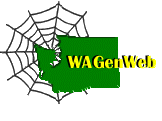Pioneer life in the Benton Co. WA area
Prayer Started Pioneer Meal/Dinner Lasted Hour or More
By BURTON 0. LUM
Tri-City Pioneer
Tri-City Herald, Sunday, 24 June 1962
The social decorum of the pioneers was not great. Its enforcement was quite strict however. There were certain things that were permissible and other things that were tabu. The sitting down at the table was to be accomplished with as little noise and confusion as possible. The father, as soon as he saw that all were seated, bowed his head, as did all those present. He then thanked the Heavenly Father for the food and asked for His guidance, forgiveness and also for the fulfillment of his prayer. The father was the family’s head. He cheerfully performed the tasks entailed by his position.
The pioneer mother did not work out; she had plenty to do in the home. She sat at the foot of the table and by her side in a high chair, sat the youngest child. The food had been placed on the table by the mother, assisted by the older children. The younger children were seated between the older children who could help them in their use of the knife, fork and spoons. The food was brought to the table in tureens, serving dishes and platters. The table was set with plates for the entire family. The father’s cup at the head of the table was a large mustache cup because most of the pioneers wore beards or mustaches in those days. The children were served whole milk to drink.
Breakfasts were varied. Old Fashioned oatmeal or cornmeal mushes were served; eggs soft boiled or fried; bacon and fried side pork; buttermilk or baking powder biscuits and fried potatoes. Toast was not served very often, as there were no toasters. Ham was not fried more than once week. Fried bacon was served quite often. Hot cakes with molasses or sugar syrup or fruit jams were often prepared.
The pioneer breakfast was quite a substantial meal. It was eaten rather early in the morning, as soon as the cows had been milked, the pigs and chickens fed, and the work stock watered, fed and harnessed.
Lunches were put up for those that worked in the fields. Regular lunch pails and thermos bottles were unknown in those days. Lunches were put up and packed in an empty five, pound lard pail, in which was placed a clean pint whisky bottle filled with coffee. If more than one was to be fed, a ten pound lard bucket was used. The mother and children that remained at home generally ate a light lunch of bread and milk with soft-boiled eggs. The dessert was generally spongecake with dried apple sauce.
The evening meal was the large meal of the day. It was not called dinner, but was known as supper. It was not served until all the evening chores were done. It was the last meal of the day and was unhurried. An hour or more was spent while the food was being consumed. Everyone gave an account of his day’s experiences. The father outlined the procedure for the morrow. The mother started to clear the table as soon as everyone had made his report. This was quickly done by the willing hands of older children, who set the breakfast table for morning. The work-stock was bedded down and the pioneer and his family retired for the night.
This country was so thinly settled in those early days that the pioneers were always glad to see new settlers. They never considered a settler’s politics or religion, as long as he paid his debts and was reasonably honest. He was accepted as a member of the community. There were no churches or religious meeting in those days; every settler’s family was a unit of its own. Everyone was so busy in securing a living, with just the bare necessities of life: food, clothing and shelter. They had little time for recreational or social pleasures.
Return to Index of Burton Lum Articles

